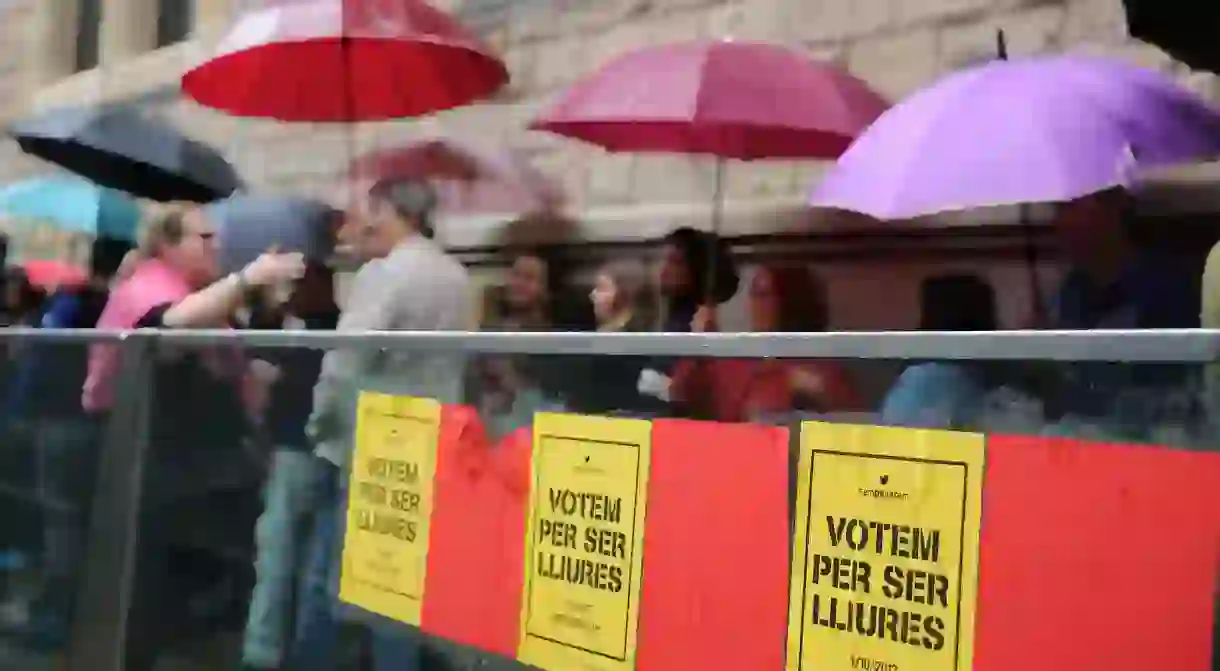11 Things You Should Know if You're Travelling to Barcelona Now

On October 1st the Catalan Government organised a referendum on the question of Catalan independence, despite the referendum having been declared illegal by the federal government in Madrid. Following images of police closing down polling stations and clashing with protestors, many travellers are wondering whether it is still safe to travel to Barcelona. Here is what you need to know about travelling to Barcelona at this time.
Barcelona remains by and large a safe place to visit
Despite the current political situation, it’s important to remember that Barcelona is a relatively safe place to travel by world standards. Like many other European cities it remains on high alert for terror attacks and the official advice is that a terrorist attack is very likely to happen in Spain. However, from a traveller’s perspective, the events of the past days have not made it more dangerous for visitors to the city so long as you are minimally prudent.

… but tensions are high
This is a crucial moment in Spanish politics and the seriousness of the events that have taken place over the past few days are not to be taken lightly. This is a highly divisive matter even within Catalonia and it’s not uncommon for neighbours, colleagues or even members of the same family to disagree about the situation. Be careful about what you say when discussing the matter publicly as sensitivities are high and the situation is complex.
The international community is divided on the matter
There has so far been a mixed response from European and world leaders to the events which took place on October 1st. Some major actors – such as the European Commission and Boris Johnson, the UK’s Foreign Secretary – have declared that this is an internal matter for Spain to deal with. While others – such as the Belgian Prime Minister Charles Michel and Scottish Prime Minister Nicola Sturgeon– have denounced the police’s handling of the situation on Sunday.
A general strike has been called for Tuesday October 3rd
A general strike has been called for Tuesday October 3rd by pro-independence associations, unions, and business representatives in reaction to the perceive police brutality exerted in the crackdown on the referendum this Sunday. As a result, some shops and businesses in the city will be closed and there may be travel delays.
Stay safe by avoiding demonstrations
The official UK Government travel advice states that the demonstrations ‘may occur with little or no warning and even demonstrations intended to be peaceful can escalate and turn confrontational’. There are likely to be protests over the course of the next few days and police presence is high across the city.

Police stations and government buildings are also hotspots
You’re most likely to encounter protests and demonstrations outside police stations, government buildings and certain major squares like Plaça Catalunya. These are also places where you’re likely to find heightened police presence as a result and confrontation between the police and protestors cannot be ruled out.
Some people who voted in the referendum voted ‘no’
There are Catalans who believe that the Catalan electorate should be allowed to vote on the matter of independence, even if they personally do not support independence. Preliminary results released by the Catalan government show that 8% of those who went to vote on Sunday voted ‘no’. However, many of those who do no support independence did not vote in the referendum as they supported Madrid’s ruling that it was illegal.

While some who are in favour of independence did not vote
On the other hand, some Catalans did not vote on Sunday despite being in favour of independence. Some of the most common reasons for this are because they respected Madrid’s ruling, because they felt that the result wouldn’t count anyway or because they were worried of the consequences of going to vote. The bottom line is, don’t assume people’s political views based on their actions on Sunday alone.
You will see lots of flags and they all have different meanings
Hanging a flag from your balcony to show your support or opposition to independence is not uncommon in Catalonia. Hanging the Spanish flag is usually considered a sign of support for the federal government and a unified Spain. Hanging a Catalan flag or senyera generally signals a support for Catalan identity and culture but not explicitly pro-independence. While the estelada – a Catalan flag with a white star on a blue background – is the flag of the Catalan independence movement.

There’s likely to be more turmoil in the next few days
The issue of Catalan independence and the referendum are far from over and you can expect to see more disagreement between the federal and Catalan governments in the next few days, weeks and even months. International leaders have called on both parties to establish a dialogue and find a peaceful solution. Keep up to date with the latest news so you know what’s happening around you.
Barcelona is still the same city we know and love
The past few months have been incredibly hard for the city and these are particularly trying times for local residents. Despite this, the city remains and incredible destination rich in culture, history and art and this is something its residents are keen for us all to remember.













